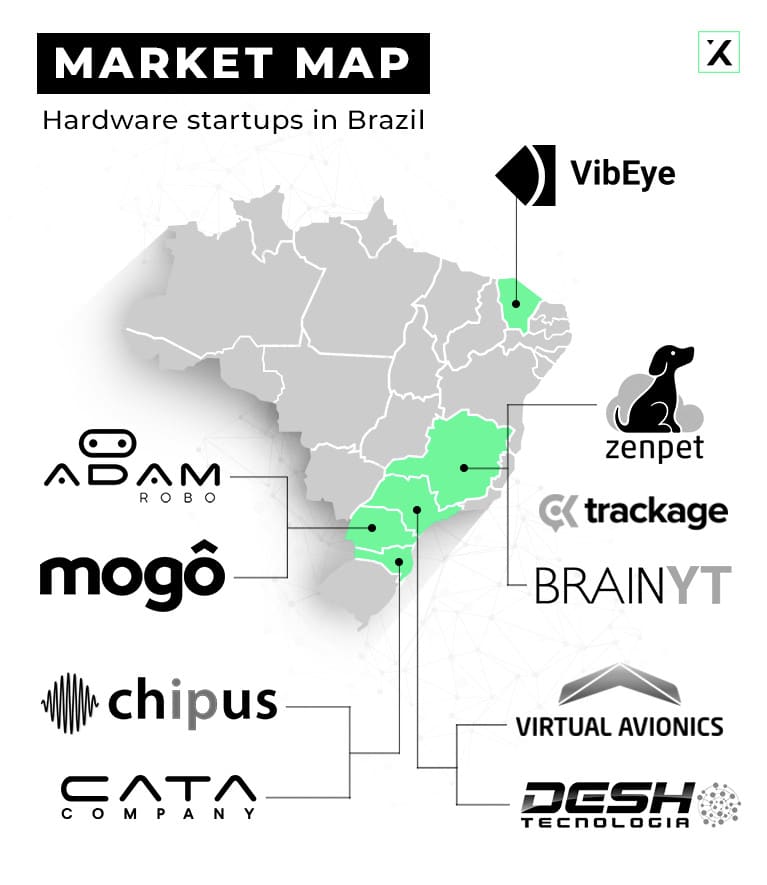Contxto – Nothing feels more empowering to entrepreneurs and developers than seeing their project come to fruition. For software engineers, writing a functioning code is something to feel really proud of.
But for hardware engineers, however, seeing the impact that your work has done is as rewarding as coming home from work to eat your favorite meal. This is especially true when the end result is an actual physical, moving tech gadget.
The following ten companies are just an example of the potential Brazil has in terms of hardware development.

Adam Robo (Curitiba)
What began as a childhood dream to change the world has turned into a preventative health-tech startup serving the visually impaired. For the past 30 years, Adam Robo has been perfecting its disruptive technological solution capable of diagnosing vision-related problems.
In essence, the Adam Robo “robot” performs visual acuity tests while also conducting primary health screenings. Within five minutes, the machine identifies visual ailments ranging from myopia, farsightedness, color blindness, among others. This is thanks to Adam Robo’s embedded software and hardware, in addition to its extensive database.
Zenpet (Minas Gerais)
“Piece of mind for pet lovers” is Zenpet’s motto. The startup uses state-of-the-art hardware to design the “Zenpet Feeder.” Specifically, users control the dosage of food and water through a smartphone mobile application. With this, they schedule feeding times. Additionally, users can interact in real time with their pets via audio or video calls.
Another unique app feature is its pet health agenda, which helps owners know when it is time for their pets to get a vaccine or anti-flea medicine. Moreover, if a home loses electricity, the Zenpet Feeder has an internal battery to continue dispensing food and water rations for pets.
Mogo (Paraná)
Mogo has launched a friendly robot attendant that weights plates at buffets for the sake of self-service. Always courteous and accurate, the jovial machine guarantees agility and convenience for restaurant managers. Not only does Mogo’s product weigh the plate and print the receipt, but it also greets customers and is compatible with any API management system.
Partners can gain a lot from implementing Mogo’s services in restaurants. According to the website, the application grants greater control of your operations. That is to say, food establishment can better track total sales value, the number of kilos served, net profit, etc. Even better, users can access this information from anywhere with an internet connection.
Vibeye (Ceará)
The visually impaired can better navigate around cities with Vibeye’s hardware. In consideration of traditional walking sticks that only detect dangers from the waist down, this startup designed the “VibSense” and vibrating bracelet for enhanced safety. So, if users are about to crash into an unseen object, the VibSense warns the person to stay clear.
Vibeye has also created an urban mobility app, Vib Mob, for those with poor eyesight. Together, users work with one another to create a collaborative map to showcase safe areas to navigate through.
Virtual Avionics (São Paulo)
Electronic engineers, mechanical designers, computer scientists, and pilots have created top-tier flight simulation hardware at Virtual Avionics (VA). The team does extensive research and development to roll out its innovations. This way, the company serves companies, pilots, cadets, and aviation wonks to heighten their skills.
VA’s products are interactive. One of these includes an FMS Trainer that teaches users how to devise a flight plan. More advanced, the Fixed Base Trainer prepares people for full-scale cockpit operations. It also meets FTD certification requirements while teaching users all the ins-and-outs of an aircraft.
Desh Technologia (São Paulo)
Accelerated by Startup Brazil, Desh is pushing the Industry 4.0 envelope. The tech startup designs wireless industrial tools to nurture the creation of “smart cities” in Brazil. To accomplish this, it focuses on areas like IoT, modern solutions for energy, water, gas, and oil utilities, as well as agrotech.
Due to its “robust, reliable and cost-effective” services, clients can take advantage of its customizable IPv6 network that connects multiple services to a single network. The company assures connectivity from any location with its Low-Power Wife Area terminals. Previously, FAPESP’s accelerator program chosen approved Dean’s Smart City research.
Chipus Microelectronica (Santa Catarina)
The semiconductor company develops systems of chips (SoCs) as well as “ultra-low power, low-voltage, analog and mixed-signal integrated circuits (ICs) for customers. The Florianópolis-based startup possesses wide knowledge in power management and data converters. Chipus has developed over 200 IP blocks since its 2008 founding.
It also has a Silicon Valley subsidiary and deploys sales teams in the United States as well as Europe. Furthermore, Chipus became ISO-certified for its Integrated Circuits Design. The title takes into consideration customer focus, upper-level management, continual improvement, plus other factors.
Cata Company (Santa Catarina)
Cash management is what Cata provides to the retail, financial and security markets. Present in 207 cities at over 160 companies, the U.S.-headquartered company applies IoT technology to its hardware and software. Some of its on-demand products include Cata Moneda, Cata Cash, Super Cabinet, and Cata Cloud.
The Cata Moneda machine helps retailers separate currencies. Similarly, the high-tech Cata Cash safebox identities fraudulent bank notes. Banks and treasuries also utilize the Super Cabinet to protect money while Cata Cloud assists partners in tracking deposits, collection, period reports, etc.
Trackage (Minas Gerais)
Known for its “traceability” expertise, this startup uses IoT software and device to optimize operations for clientele. Trackage’s products aid partners in monitoring processes and logistics, fleets, loads, as well as industrial assets at reduced costs.
All of this informations is available in real-time and contributes to better decision making for the company. From the looks of it, Trackage aspires to join Industry 4.0 by streamlining logistics at efficient low-rates. In 2018, ABDI chose Trackage as the “best startup in Brazil to connect with industries.”
Brain YT (Belo Horizonte)
Brain YT offers visual representations of factory operations for Brazilian industry players. Beginning in 2017 in Belo Horizonte and developing technology in Silicon Valley, the startup ensures that partners scale with its AI and IoT solutions.
The company worked with the University of Berkely’s Center for Technology and Innovation to create Smart Cameras, for example. These devices collect data of events or malfunctions in the factory. Data also becomes part of a virtual model on BrainYT Data Engine.
Conclusion
Based on the McKinsey Global Institute’s prediction that IoT yields a potential impact of up to US$11.1 trillion by 2025, it seems like Brazil is well on its way to becoming a global contender in this niche market.
The Brazilian Development Bank (BNDES) concurs, saying that Brazil could potentially attract between US$50 billion to $200 billion of these funds. Taking into consideration so much entrepreneurial activity in IoT, robotics and AI, the future of software has never looked so promising for Brazil.
Written by Jacob Atkins and Victor Cortes
-JA & VC






